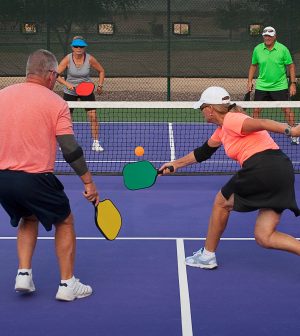- Could Your Grocery Store Meat Be Causing Recurring UTIs?
- Are You Making This Expensive Thermostat Error This Winter?
- Recognizing the Signs of Hypothyroidism
- 10 Strategies to Overcome Insomnia
- Could Artificial Sweeteners Be Aging the Brain Faster?
- Techniques for Soothing Your Nervous System
- Does the Water in Your House Smell Funny? Here’s Why
- Can a Daily Dose of Apple Cider Vinegar Actually Aid Weight Loss?
- 6 Health Beverages That Can Actually Spike Your Blood Sugar
- Treatment Options for Social Anxiety Disorder
Many Seniors Love Pickleball, But Injuries Can Happen

Pickleball has become a wildly popular sport for older Americans, but seniors who enjoy playing it should know about potential injuries and how to avoid them.
The most common problem is with the rotator cuff tendon in the shoulder, which can cause pain. Issues can included tendonitis, bursitis and even a tear in the tendon. Bigger tears are harder to fix and can make your arm weak.
“The unfortunate reality of the rotator cuff is that everyday use can cause tearing and damage,” said Dr. Bruce Moseley, a surgeon in the Joseph Barnhart Department of Orthopedic Surgery at Baylor College of Medicine in Houston.
“You don’t necessarily have to do anything wrong or abnormal to get a rotator cuff tear — in many instances it just happens as a consequence of living,” he said in a college news release.
For a lot of people, it’s not an accident or injury that causes rotator cuff damage, but use over time. Pickleball requires people to reach overhead while using a lot of force, which can risk damaging or tearing the rotator cuff.
Tears aren’t always preventable, but stretching and light or moderate strength training may keep it healthier and more flexible.
“If you warm up and stretch before your activity and ice down afterwards, your shoulder will be better prepared for the activity and will recover quicker,” Moseley said.
If you are experiencing shoulder pain, don’t wait to see a doctor.
“The success rate of surgery to permanently fix the problem goes down as the size of the tear goes up, so if you’re having lingering shoulder pain that isn’t getting better over time and the pain is getting worse as the activity continues, I recommended seeing a specialist,” Moseley said. “If we can get to the tear and fix it while it is small, the success rate is much higher.”
The only way to repair a torn rotator cuff is through surgery. Living with it can be painful and limit movement, and it would be difficult to remain active.
Other potential racquet sports injuries are meniscus tears, tendon ruptures and aggravation of arthritic knees.
“Considering seeing a physician if you have pain that gets progressively worse in the shoulder or pain that persists for a long time after your activity. These may be warning signs of a torn rotator cuff tendon, so make sure to get it checked,” Moseley said.
More information
The U.S. National Library of Medicine has more on rotator cuff injuries.
SOURCE: Baylor College of Medicine, news release, Aug. 2, 2022
Source: HealthDay
Copyright © 2026 HealthDay. All rights reserved.










